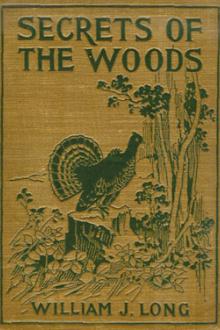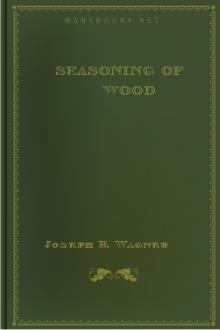Secret of the Woods - William J. Long (e reader for manga .txt) 📗

- Author: William J. Long
- Performer: -
Book online «Secret of the Woods - William J. Long (e reader for manga .txt) 📗». Author William J. Long
“After all, what place has the roar of a rifle or the smell of sulphurous powder in the midst of all this blessed peace?” I asked half sadly. As if in answer, the kingfisher dropped with his musical plash, and swept back with exultant rattle to his watchtower.—“Go on with your clatter and your fishing. The wilderness and the solitary place shall still be glad, for you and Mooween, and the trout pools would be lonely without you. But I wish you knew that your life lay a moment ago in the bend of my finger, and that some one, besides the bear, appreciates your brave warning.”
Then I went back to the point to measure the tracks, and to estimate how big the bear was, and to console myself with the thought of how I would certainly have had him, if something had not interfered—which is the philosophy of all hunters since Esau.
It was a few days later that the chance came of repaying Koskomenos with coals of fire. The lake surface was still warm; no storms nor frosts had cooled it. The big trout had risen from the deep places, but were not yet quickened enough to take my flies; so, trout hungry, I had gone trolling for them with a minnow. I had taken two good fish, and was moving slowly by the mouth of the bay, Simmo at the paddle, when a suspicious movement on the shore attracted my attention. I passed the line to Simmo, the better to use my glasses, and was scanning the alders sharply, when a cry of wonder came from the Indian. “O bah cosh, see! das second time I catchum, Koskomenos.” And there, twenty feet above the lake, a young kingfisher—one of Koskomenos’
frowzy-headed, wild-eyed-youngsters—was whirling wildly at the end of my line. He had seen the minnow trailing a hundred feet astern and, with more hunger than discretion, had swooped for it promptly. Simmo, feeling the tug but seeing nothing behind him, had struck promptly, and the hook went home.
I seized the line and began to pull in gently. The young kingfisher came most unwillingly, with a continuous clatter of protest that speedily brought Koskomenos and his mate, and two or three of the captive’s brethren, in a wild, clamoring about the canoe. They showed no lack of courage, but swooped again and again at the line, and even at the man who held it. In a moment I had the youngster in my hand, and had disengaged the hook. He was not hurt at all, but terribly frightened; so I held him a little while, enjoying the excitement of the others, whom the captive’s alarm rattle kept circling wildly about the canoe. It was noteworthy that not another bird heeded the cry or came near.
Even in distress they refused to recognize the outcast. Then, as Koskomenos hovered on quivering wings just over my head, I tossed the captive close up beside him. “There, Koskomenos, take your young chuckle-head, and teach him better wisdom. Next time you see me stalking a bear, please go on with your fishing.”
But there was no note of gratitude in the noisy babel that swept up the bay after the kingfishers. When I saw them again, they were sitting on a dead branch, five of them in a row, chuckling and clattering all at once, unmindful of the minnows that played beneath them. I have no doubt that, in their own way, they were telling each other all about it.
MEEKO THE MISCHIEF-MAKERThere is a curious Indian legend about Meeko the red squirrel—the Mischief-Maker, as the Milicetes call him—which is also an excellent commentary upon his character. Simmo told it to me, one day, when we had caught Meeko coming out of a woodpecker’s hole with the last of a brood of fledgelings in his mouth, chuckling to himself over his hunting.
Long ago, in the days when Clote Scarpe ruled the animals, Meeko was much larger than he is now, large as Mooween the bear. But his temper was so fierce, and his disposition so altogether bad that all the wood folk were threatened with destruction. Meeko killed right and left with the temper of a weasel, who kills from pure lust of blood. So Clote Scarpe, to save the little woods-people, made Meeko smaller—small as he is now.
Unfortunately, Clote Scarpe forgot Meeko’s disposition; that remained as big and as bad as before. So now Meeko goes about the woods with a small body and a big temper, barking, scolding, quarreling and, since he cannot destroy in his rage as before, setting other animals by the ears to destroy each other.
When you have listened to Meeko’s scolding for a season, and have seen him going from nest to nest after innocent fledgelings; or creeping into the den of his big cousin, the beautiful gray squirrel, to kill the young; or driving away his little cousin, the chipmunk, to steal his hoarded nuts; or watching every fight that goes on in the woods, jeering and chuckling above it,—then you begin to understand the Indian legend.
Spite of his evil ways, however, he is interesting and always unexpected. When you have watched the red squirrel that lives near your camp all summer, and think you know all about him, he does the queerest thing, good or bad, to upset all your theories and even the Indian legends about him.
I remember one that greeted me, the first living thing in the great woods, as I ran my canoe ashore on a wilderness river.
Meeko heard me coming. His bark sounded loudly, in a big spruce, above the dip of the paddles. As we turned shoreward, he ran down the tree in which he was, and out on a fallen log to meet us. I grasped a branch of the old log to steady the canoe and watched him curiously. He had never seen a man before; he barked, jeered, scolded, jerked his tail, whistled, did everything within his power to make me show my teeth and my disposition.
Suddenly he grew excited—and when Meeko grows excited the woods are not big enough to hold him. He came nearer and nearer to my canoe till he leaped upon the gunwale and sat there chattering, as if he were Adjidaumo come back again and I were Hiawatha. All the while he had poured out a torrent of squirrel talk, but now his note changed; jeering and scolding and curiosity went out of it; something else crept in. I began to feel, somehow, that he was trying to make me understand something, and found me very stupid about it.
I began to talk quietly, calling him a rattle-head and a disturber of the peace. At the first sound of my voice he listened with intense curiosity, then leaped to the log, ran the length of it, jumped down and began to dig furiously among the moss and dead leaves. Every moment or two he would stop, and jump to the log to see if I were watching him.
Presently he ran to my canoe, sprang upon the gunwale, jumped back again, and ran along the log as before to where he had been digging. He did it again, looking back at me and saying plainly: “Come here; come and look.” I stepped out of the canoe to the old log, whereupon Meeko went off into a fit of terrible excitement.
—I was bigger than he expected; I had only two legs; kut-e-k’chuck, kut-e-k’chuck! whit, whit, whit, kut-e-k’chuck!
I stood where I was until he got over his excitement. Then he came towards me, and led me along the log, with much chuckling and jabbering, to the hole in the leaves where he had been digging. When I bent over it he sprang to a spruce trunk, on a level with my head, fairly bursting with excitement, but watching me with intensest interest. In the hole I found a small lizard, one of the rare kind that lives under logs and loves the dusk. He had been bitten through the back and disabled. He could still use legs, tail and head feebly, but could not run away. When I picked him up and held him in my hand, Meeko came closer with loud-voiced curiosity, longing to leap to my hand and claim his own, but held back by fear.—“What is it? He’s mine; I found him.
What is it?” he barked, jumping about as if bewitched. Two curiosities, the lizard and the man, were almost too much for him. I never saw a squirrel more excited. He had evidently found the lizard by accident, bit him to keep him still, and then, astonished by the rare find, hid him away where he could dig him out and watch him at leisure.
I put the lizard back into the hole and covered him with leaves; then went to unloading my canoe. Meeko watched me closely. And the moment I was gone he dug away the leaves, took his treasure out, watched it with wide bright eyes, bit it once more to keep it still, and covered it up again carefully. Then he came chuckling along to where I was putting up my tent.
In a week he owned the camp, coming and going at his own will, stealing my provisions when I forgot to feed him, and scolding me roundly at every irregular occurrence. He was an early riser and insisted on my conforming to the custom. Every morning he would leap at daylight from a fir tip to my ridgepole, run it along to the front and sit there, barking and whistling, until I put my head out of my door, or until Simmo came along with his axe. Of Simmo and his axe Meeko had a mortal dread, which I could not understand till one day when I paddled silently back to camp and, instead of coming up the path, sat idly in my canoe watching the Indian, who had broken his one pipe and now sat making another out of a chunk of black alder and a length of nanny bush.
Simmo was as interesting to watch, in his way, as any of the wood folk.
Presently Meeko came down, chattering his curiosity at seeing the Indian so still and so occupied. A red squirrel is always unhappy unless he knows all about everything. He watched from the nearest tree for a while, but could not make up his mind what was doing.
Then he came down on the ground and advanced a foot at a time, jumping up continually but coming down in the same spot, barking to make Simmo turn his head and show his hand. Simmo watched out of the corner of his eye until Meeko was near a solitary tree which stood in the middle of the camp ground, when he jumped up suddenly and rushed at the squirrel, who sprang to the tree and ran to a branch out of reach, snickering and jeering.
Simmo took his axe deliberately and swung it mightily at the foot of the tree, as if to chop it down; only he hit the trunk with the head, not,the blade of his weapon. At the first blow, which made his toes tingle, Meeko stopped jeering and ran higher. Simmo swung again and Meeko went up another notch. So it went on, Simmo looking up intently to see the effect and Meeko running higher after each blow, until the tiptop was reached. Then Simmo gave a mighty whack; the squirrel leaped far out and came to the ground, sixty feet below; picked himself up, none the worse for his leap, and rushed scolding away to his nest. Then Simmo





Comments (0)